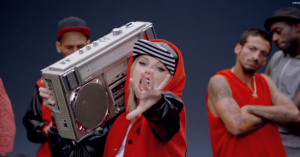There is little point in dissecting the Mark Romanek-directed music video for Taylor Swift’s new single “Shake It Off”. It is going to spark the same controversies that have surrounded nearly every white pop starlet in the past five years, in the appropriation/misappropriation of black pop culture and symbology. Yes, there are Dazzy Duks twerking. At this stage, people are just going to have to accept that these actions and manners of dress have crossed over. At least Swift isn’t groping her own crotch in the video.
Separating the video from the song seems like a strange activity now that YouTube is the dominant music-transmission mode for the smartphone generation. The video is the song. The song is like a snapshot of the video, whereas the song once was key and the video was a promotional tool. In the selfie-obsessed world we live in, everything is a promotional tool, even one’s own romances and romantic failures, which Swift has used well in her public relations death march to the sea. It’s not unfair game to bring that up considering she does the same in the lyrics of “Shake It Off”. What purports to be another in the long, way-long, far-too-long trend of inspirational affirmation songs is actually little more than Swift talking about herself again.
 The song comes from her new album 1989, which is said to be a homage to the pop of that era. Again, taking this single as evidence, that’s also a false claim. This track sounds less like 1989 than, perhaps, 2009 (The Ting Tings’ “That’s Not My Name”) or 2003 (Andre 3000’s “Hey Ya!”). The reason the album is called 1989 is because that was the year Swift was born. Notice a pattern?
The song comes from her new album 1989, which is said to be a homage to the pop of that era. Again, taking this single as evidence, that’s also a false claim. This track sounds less like 1989 than, perhaps, 2009 (The Ting Tings’ “That’s Not My Name”) or 2003 (Andre 3000’s “Hey Ya!”). The reason the album is called 1989 is because that was the year Swift was born. Notice a pattern?
“Shake It Off” nonetheless arrives as a bulletproof machine melding corporate synergy and a wanting audience. Swift’s fans love to hear Swift talk about Swift, and are perfectly happy to attempt some semblance of identification. They can try to believe Swift is talking in universal terms, applying the “when life hands you lemons, haters gonna hate” messaging to their own circumstances, stating that “Taylor speaks for all of us.” It will work for a lot of people, particularly her Swifties, but there have been few clear cut examples of pathological narcissism to enter the culture as brazen as this one. There is only one figure she is concerned with, and she serenades her constantly.
Problematically, “Shake It Off” is a catchy earworm. It is a by-the-numbers modern pop tune meant to drive itself straight into your brain and stay there, and it does. Had there been something more substantial to attach to this — real sentiment, a hint of soul, a unique perspective — it could have been a much better offering. You will find yourself singing along to “Shake It Off” and maybe doing that butt dance in your car seat as it plays along, but you may feel used for doing so. It may not be a compliment to say the song is enjoyably competent, that it hits its marks in a predictable fashion, and still is ingratiating on the surface. You can fault Swift and her army of production professionals for making product, but it still is entertaining product.
Shallow and calculated, “Shake It Off” is everything you expect a pop song in the year 2014 to be, for better or worse. And so far as Taylor Swift is concerned, that’s all that matters. It is her world. We’re only here to buy into it.





Comments